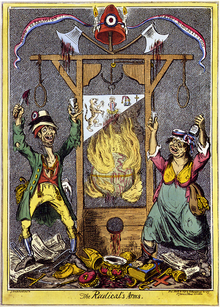Historical
 Many historical events held great significance in
forming the nationalism that sparked the rebellion. One such event that drew
the grounds of this rebellion was the historical system of absolute monarchy.
This form of government gave full power to the kind. When the rebellion
abolished this unjust standard, the Jacobin reign of terror was introduced.
Their motives were to establish safety among France however their means were
cruel and diplomatic. For example, anyone who objected to their rule would be
sent to the guillotine.
Many historical events held great significance in
forming the nationalism that sparked the rebellion. One such event that drew
the grounds of this rebellion was the historical system of absolute monarchy.
This form of government gave full power to the kind. When the rebellion
abolished this unjust standard, the Jacobin reign of terror was introduced.
Their motives were to establish safety among France however their means were
cruel and diplomatic. For example, anyone who objected to their rule would be
sent to the guillotine.
On another note, the event that symbolized the motive
of the entire rebellion was officialised through the storing of the bastille.
After being locked out by the estates general, the 3rd estate was determine to not disband
until they reached their motives of freedom - this was through the tennis court
oath. A sense of nationalism emerged in the 3rd estates and the spark of revolution
was ignited as peasants took power into their own hands when the storming of
the bastille was instigated. The bastille was a prison which held political
prisoners, so taking control over this area had to become a historical symbol
over this area had become a historical symbol for the oppressed society. This
is celebrated by the French people every year on July 14th.
Moreover, another historical event which motivated the
French citizens to strive for equality was when the king and queen were
charged.
Social
- Decentralization gave the citizens more power
- 1st and second estates
depended on the 3rd estates
- 3rd estates were
exploited and worked to the bone
The third estates were deprived of their fundamental
rights through exploitation of their rights because of their lack of speech.
This was questioned by the third estates and new ideas emerged and due to the
idea of freedom they wanted a decentralized government. The Jacobin party was
formed after the tennis court oath and that gave equal power to everyone. Until
the king was decapitated the Jacobins started decapitation people against them.
The reason the Jacobins were decapitating people against them is because they
were diplomats and were power hungry.
The New Justice?
The system had avoided to charge the nobles and the clergy from taxes, an ad valorem tax on land. The tax burden,
therefore, devolved to the peasants, wage-earners, and the professional and
business classes, also known as the third estate. Further, people from
less-privileged walks of life were blocked from acquiring even petty positions
of power in the regime. This caused further resentment.
Robespierre - Hebert
Another anti-clerical uprising was made possible by the installment of the Republican
Calendar on 24 October 1793. Against
Robespierre's concepts, Hebert’s concepts led to a religious movement.
The Reign of Terror had rusted the revolutionaries, while temporarily
ending internal opposition. The Jacobins expanded their intake for army, and Carnot replaced many aristocratic officers with soldiers who had demonstrated
their patriotism, if not their ability. The Republican army was able to throw
back the Austrians,Prussians, British, and Spanish. Near
the end of 1793, the army had started to break apart and they had lost their
hold. The Ventose
Decrees proposed the confiscation of the goods
of exiles and opponents of the Revolution, and their redistribution to the
needy; and the policy was never actually implemented.
Jaques Necker.
Swiss at birth, Jacques was a finance minister of Louis XVI, a post he had held before the start of the French Revolution. He was one of Louis most trusted men’s and he also managed most of his political work. He had talk to Louis about the peasants wanting justice and also warned him about the outcome if he had chosen to ignore it would cause an uprising. Necker was seen as the savior of France while the country stood on the brink of ruin, but his actions could not stop the French Revolution. He advocated doubling the representation of the Third Estate to satisfy the people. But he failed to address the matter of voting — rather than voting by head count, which is what the people wanted; voting remained as one vote for each estate




No comments:
Post a Comment